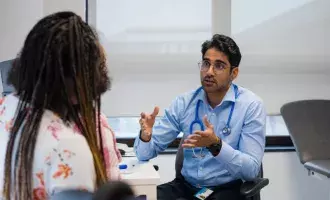Set alongside the rapid spread of Covid-19 and international efforts to contain it, the pressure on health services to help patients access the most appropriate treatment in a timely way is expected to grow at unprecedented speed over the weeks and months ahead.
In addition to these pressures, professional as well as social distancing has become critical to supporting sustainable and safe healthcare delivery during a period when many staff and patients may be self-isolating.
Healthcare systems are facing the challenges of an ageing population, additional costs of advances in clinical care, and a shortage of resources. Added to this, the NHS is finding it needs to adapt or replace old and inefficient technology and buildings.
To meet these challenges, health services need to develop much more integrated approaches to care, increase the focus on prevention and early intervention, and make much greater use of digital solutions.
Healthcare systems play a vital role in our society. The impact they have on millions underlines the crucial importance of innovative system-focused technology in the sector. But our health systems are not always working as efficiently as they could or should be, which is bad for service providers and patients alike. The good news is we already have some of the tools to fix key issues in health system inefficiency – not least in the form of devoted, dedicated staff, working tirelessly to improve the situation on the ground.
Those people are an immense asset to draw on and, rather than replacing these experts, technology can expand their reach and optimise their brilliant ideas, partly by lightening the administrative load and removing inefficiencies that belong to a different age. For example, using technology to digitise patient records, or innovative solutions, such as blockchain, to provide central, secure access to healthcare data would go a very long way to saving time and effort, and to directly improving outcomes for patients.
But, far beyond just collating documents and making them more accessible, easier access to patient records, as well as improved record data quality, will allow technologies such as machine learning and artificial intelligence to dig much deeper.
By exploring the data more deeply and identifying trends within these records, artificial intelligence (AI) can use the sheer weight of that data to help explore causes for illnesses, streamline diagnostic approaches, and even find new cures for important global diseases. Prior to Covid-19 the UK Government committed to investing £133 million in healthcare innovations that will use technologies like AI to tackle diseases including cancer and dementia. But such initiatives are just the beginning.
That’s partly because of the sheer wealth of data at our disposal, but also because of the very nature of artificial intelligence. A key limitation to technology at present is human intelligence – but eventually, digital process creation and evolution won’t require human input. Instead, machines will be trained and developed by machines, becoming progressively more efficient and more accurate – before, one day, re-imagining themselves.
In the longer term, however, the impact of digital technologies will reach much further than our current health systems. Technology will enable a wider fusion of health and social care, necessary both at a conceptual and a government level. This fusion will make the overall delivery of care more efficient, eliminating waste and optimising resource allocation, not just by providing better healthcare but by giving consumers the knowledge and empowerment to manage their own health. Better social conditions lead to a healthier population, and they also better equip that population to look after its own wellbeing by promoting and protecting health.
Rather than siloed approaches aimed at fixing symptoms when they emerge, technology can enable deeper collaboration and drive efficiency, addressing real problems and vastly improving people’s lives. Our clients can tap into the unique breadth of our expertise across the entire employee life-cycle; so, whilst we can provide you with leading resourcing solutions, whatever your challenges, our experts are on hand to help you deliver better outcomes across the board, from wholesale consulting and digital, to workforce analytics and learning.
But, far beyond just collating documents and making them more accessible, easier access to patient records, as well as improved record data quality, will allow technologies such as machine learning and artificial intelligence to dig much deeper.

Neal Mankey
Associate Director, Interim Practice at Veredus
Neal is an Associate Director with many years’ experience as a head-hunter across a number of different sectors, more latterly healthcare, and is known for his honest approach and excellent communication skills, bringing energy and focus to each assignment.







